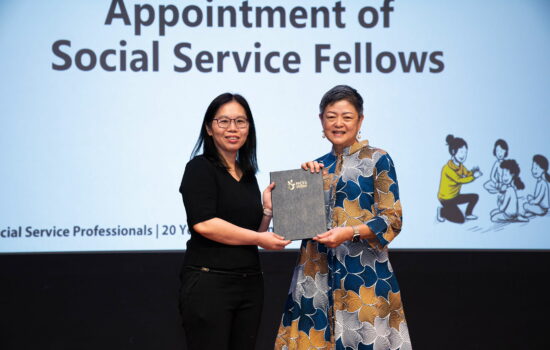The COVID-19 situation has wreaked havoc around the world, impacting economies and creating employment woes for many, including young job seekers who have graduated in this challenging period. Here, our Employment Support Specialists (ESS), and Asia Pacific Breweries Foundation scholar Teo Zi Lin, who graduated from the National University of Singapore last year, share some tips for fresh graduates looking to navigate the job-seeking arena.
1. Polish your cover letter and resume
ESS: Resumes and cover letters are the key documents employers or recruiters look at to determine if they would like to meet you in person. It is therefore crucial to spend time crafting a well-written resume. Do your research on the potential companies you are keen on and highlight the skillsets and strengths relevant to the job role. Keep abreast of what employers are looking out for in the particular job industry and consider training to upgrade your skills if needed. Constantly review and update your resume to include these relevant certifications and consider sharing key achievements in your past internships or education journey which can boost your chances of standing out among other candidates.
2. Manage your expectations
ESS: Understand yourself well. Take stock of your strengths, areas of improvement and dig deeper into questions such as what is important to you in a job. Some people prioritise learning and picking up new skills while others prioritise having work-life balance. This will help you to manage your expectations of the job. For example, if you would like a higher starting salary, the job may come with more demanding work hours or the need to take on more job responsibilities. If you have doubts or concerns, do not hesitate to check in with potential employers or their Human Resource personnel before accepting the role.
Zi Lin: You should try to find out your market value and worth. Speak to friends or acquaintances who are already working in the industry and get a sense of the starting pay range in the market. However, most companies are likely to be impacted by the pandemic situation. Thus, do your homework but manage your expectations when it comes to benefits and salaries. Other factors may also be important such as company culture, as well as learning and development opportunities.
3. Cast your net wide wisely
ESS: I would advise to cast your net wide in a wise manner. It is crucial to carefully read and consider the job descriptions and decide whether the job is suitable for you. You want to spend your time and energy to engage meaningfully with employers and companies to maximise your chances in a productive manner. As the cliche goes, the quality of your application is still more important than quantity.
Zi Lin: If you come across a job listing that piques your interest, apply for it! Rather than spending time to debate whether you should apply, it is better to give it a shot and apply first. Personally, I have applied for over 30 positions and some may feel that this is an “overkill”. Despite the numerous applications, only two companies came back with an offer. So cast your net wide! There is still time to consider after you have been offered the job.
4. When should you disclose your disability?
ESS: There are different perspectives but as a general rule of thumb, you should disclose your disability in the job application form if asked there, and most definitely before accepting the job offer.
It may sometimes be helpful to disclose your disability at the onset as it can help the job application process. For example, it would be helpful for Deaf candidates to indicate “text or email” as your preferred mode of communication so that employers could follow up with a text or email instead of calling you. It would also help to facilitate interview arrangements.
Another example is when employers invite candidates who are wheelchair users for an onsite interview, but the workplace is not wheelchair-friendly and candidates only find out on the day of the interview. You want to minimise confusion right at the start and a great way is to be upfront about your disability and inform the employer of the support or accommodation you need as soon as you can.
It would also be helpful to anticipate questions relating to your disability and how you have overcome these challenges in life or during past internship experiences. This can help to allay the employers’ concerns about your ability to do the job well.
Zi Lin: During interviews, you should avoid mentioning your disabilities at the start. Always focus on sharing your skills and contributions that you can bring to the company first. The reason for this is because you do not want to form the impression that your disabilities define you as a person. Your skills and values are what define you, not your disabilities. I usually disclose my hearing loss at the end of the interview when the interviewer asks if I have any more questions or things to bring up.
Do note that disclosure at the end only applies during interviews. If your application process/form requires declaration of any disabilities, you should declare accordingly. Most often during interviews, if they are not already aware that I am hard of hearing from the application form, my disclosure surprised them because they did not notice. This helped to bring across the fact that with my hearing aid, I can function or communicate as well as any other person, and my impairment will not impede my performance at work.
5. Preparing and attending the job interview
ESS: Do your research on the company and the job role you are applying for. Go through potential questions from employers and practise answering them aloud, as if in an actual interview. This not only helps you to feel more comfortable, it also builds your confidence when answering the questions. While preparation is key, your answers should not be scripted, but genuine and show your personality.
For virtual interviews, factors such as lighting, background objects and sounds, volume of your voice etc make a huge difference in leaving a good impression. Familiarise yourself with the different virtual platforms such as Zoom, Microsoft Teams, and Skype so that you would be well versed with the functions when you need to access them.
If the interviewers make inappropriate or biased remarks relating to your disability, remember to stay calm and respond politely. Instead of burning bridges, turn this into an opportunity to showcase how you respond under pressure and navigate challenges in life including the achievements that you have made.
For persons with disabilities who need additional support in job-seeking, please approach our Employment Support Programme for further assistance.
While it is normal to feel anxious in this trying period, remember to also take a break from the job search to do something that you enjoy. You have just successfully completed your formal education and you deserve a good break too. We wish you a smooth journey ahead as you make your transition to the working world.





